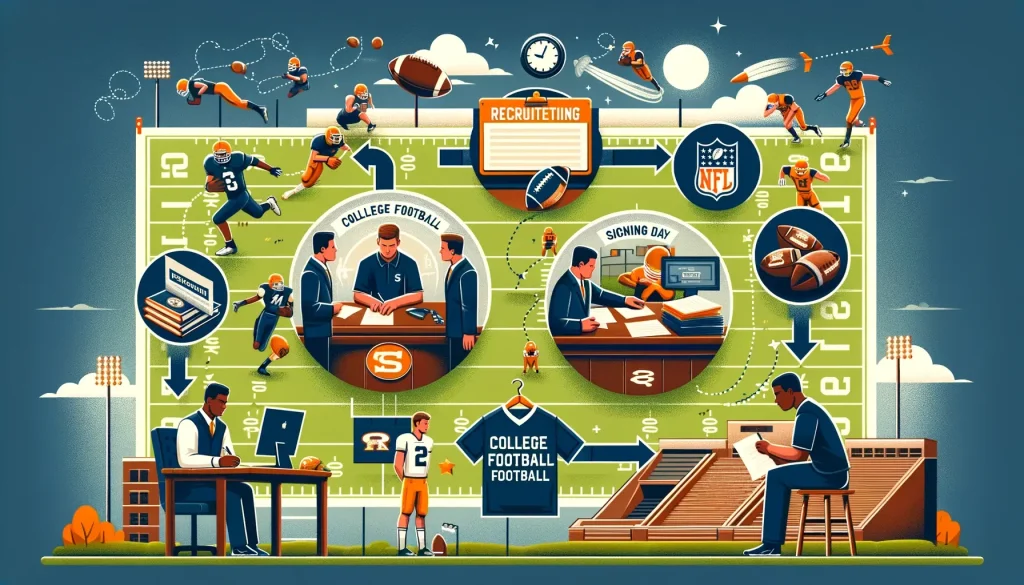How to Get Recruited for College Football?
Introduction
The first step for any wanna-be footballer is how to get recruited for college football. It’s an exciting and challenging endeavor for many high school athletes.
It’s a path that demands dedication, skill, and strategic planning. This process involves more than just being a standout player on the field; it requires understanding the intricacies of college football recruitment.
To successfully navigate this journey, athletes need to be proactive, well-informed, and prepared to showcase their talents both athletically and academically.
In this article, we will delve into the essential steps. We will give some crucial tips that can increase your chances in front of coaches.

When Does College Football Recruiting Start?
Recruiting for college football can start as early as freshman year in high school. Coaches begin to identify potential recruits based on their performance in games, camps and combine. It’s crucial to start early, focusing on developing your skills, understanding the game, and building a profile that catches recruiters’ attention.
How to Get Recruited for College Football?
So how to get noticed by colleges for football? To get noticed and recruited, you must excel both on and off the field. Demonstrate your skills in games and camps, maintain good grades, and proactively reach out to coaches.
Create a compelling highlight reel and keep updating your athletic and academic achievements. Networking and attending recruiting events also play a significant role.
High School Performance Role in Recruitment:
Your performance in high school games is a critical factor in recruitment. Scouts and coaches look for players who stand out in terms of skill, sportsmanship, and team contribution. Consistently good performance in high school matches increases your visibility and chances of being recruited.
A Few College Football Recruiting Facts:
Recruitment is highly competitive, with thousands vying for limited spots. Coaches seek players who fit their system both athletically and academically. Scholarships are scarce, and not everyone will get a full ride. Understanding these facts aids in establishing practical anticipations.
The Importance of Star Ratings in Football:
Star ratings, given by recruiting services, often influence a player’s recruitment prospects. These ratings are based on performance, potential, and skill level. While not the only factor, a higher star rating can increase your visibility among college coaches.
Understand How The Recruiting Process Works:
Understanding the recruiting process is crucial. It involves identification, evaluation, and communication phases. Coaches identify potential recruits, evaluate them through games and films, and then communicate with those who fit their program. Knowledge of this process helps in strategic planning.
How the New Redshirt Rule Affects Football Recruitment:
The new redshirt rule allows players to participate in up to four games without losing a year of eligibility. This rule impacts recruiting by giving freshmen more opportunities to play, thus affecting how coaches evaluate and recruit high school players.
Tips to Get Recruited for College Football and How to Get Offered a Scholarship:
Register for NCAA Clearinghouse:
Registering with the NCAA Eligibility Center is the first step for any aspiring college athlete. It’s essential for verifying your academic and amateur status. This process ensures you meet the necessary academic and athletic standards for college-level competition. Don’t delay this; the sooner you complete it, the better.
Stay On Top Of Your Grades:
Strong academic performance plays a crucial role in the recruitment process. Maintaining high grades is necessary not just for eligibility, but also to demonstrate to coaches that you’re serious and disciplined both on and off the field. Balance your time effectively between sports and studies to achieve this.
Take The Approved Required Courses:
Completing NCAA-approved courses during your high school years is a must. These courses are part of the eligibility criteria set by the NCAA, ensuring that student-athletes are prepared for the academic rigors of college. Check with your academic counselor to make sure you’re on track with these requirements.
Play for a Competitive Team:
Being part of a competitive high school team can significantly increase your visibility to college recruiters. It’s not just about playing; it’s about excelling and standing out in a team that’s known for its high level of play. This shows recruiters that you’re capable of performing under pressure and against strong competition.
Make a List of Research Schools To Find Your Best Fit:
Research and compile a list of schools that align with your academic interests and athletic abilities. Take into account factors such as the football program at the school, the academic programs available, the campus atmosphere, and the geographical location. Finding the right fit is crucial for your overall college experience.
Look for Coaches, Not Them Look for You:
Take the initiative to reach out to college coaches. Send emails, your athletic resume, and highlight videos. Show interest in their program and express why you think you would be a good fit. Don’t rely on them to discover you; take proactive steps yourself.
Spread Your Name:
Get your name out there by participating in speed workouts for football, showcases, and other events where you can demonstrate your skills. Speed workouts can improve your performance and attract attention from coaches looking for quick and agile players.
Create Your Highlight Film On Hudl:
A captivating highlight reel is essential during the recruitment process. Use platforms like Hudl to create and share your videos. Concentrate on pivotal moments that highlight your abilities, speed, agility and tactical comprehension of the game. A well-edited and concise highlight reel can make a significant difference.
Meet with an Academic Counselor at School:
Regularly meeting with your academic counselor ensures you’re on track with your grades and NCAA-required courses. They can provide valuable advice and help you manage your academic workload alongside your athletic commitments.
Compile a Calendar for Summer Camps and Combines:
So how to stand out at football camps? Plan your participation in football camps and combines. These events present excellent opportunities to display your skills, learn from coaches, and get a feel for the college-level play. Prioritize events where college coaches from your target schools will be present.
Get In Touch With College Coaches and Other Athletes:
Networking is key. Connect with college coaches, current college players, and other athletes who’ve gone through the recruiting process. They can offer insights, advice, and may even provide valuable introductions. Remember, building relationships is a crucial part of the recruitment journey.
Football Camps and Combines
Camps and combines are crucial for showcasing your skills. They provide a platform to perform in front of college coaches and scouts. Excelling in these events can significantly boost your recruitment prospects.
Train And Practice Smart And Hard!
Training smart involves focusing on both physical and tactical aspects of the game. Work on your fitness, technique, and understanding of the game. Hard work and dedication are key to standing out.
Become a Team Player
Being a team player is vital. Coaches look for players who contribute positively to the team’s dynamics, show leadership, and have good sportsmanship. These qualities are as important as individual skill.
Your Work Ethics Must be Strong
Strong work ethics set you apart. It includes dedication to training, willingness to learn, and the ability to bounce back from setbacks. Coaches value players who consistently work hard and show commitment.
Evaluating Scholarship Offers
When evaluating scholarship offers, consider factors like the school’s academic quality, football program, coaching staff, and how you fit into the team. Financial aspects and long-term career prospects are also important.
You Need To Be Realistic
Be realistic about your skills, potential, and the level of play you can compete at. Not everyone can play at Division I level. Exploring all divisions can open more opportunities.
Learn To Be Patient
Recruitment can be a lengthy process. Stay patient, keep improving, and remain proactive. Opportunities can arise at different times throughout your high school career.
Understand Scholarship Offers and How to Negotiate
Understanding the details of scholarship offers is crucial. Know what’s being offered and what’s expected of you. Learn how to negotiate effectively, focusing on your value as a player and student.

FAQs:
Conclusion
In conclusion, understanding how to get recruited for college football involves a mix of dedication, skill, and strategic planning. It’s about more than just playing the game; it’s about excelling academically, making smart choices, and actively pursuing opportunities.
Remember, every step you take, from registering with the NCAA to connecting with coaches and excelling in speed workouts, brings you closer to achieving your dream. Stay focused, be proactive, and embrace the journey of becoming a college football athlete.






